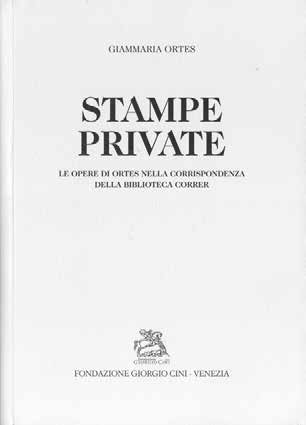Stampe private. Le opere di Ortes nella corrispondenza della biblioteca Correr
Giammaria Ortes, Stampe private. Le opere di Ortes nella corrispondenza della biblioteca Correr
edited by Laura Carnelo,
Fondazione Giorgio Cini, Venice, 2015
The third centenary of the birth of Giammaria Ortes (Venice, 1713-1790) was commemorated last year in various events organised by a special committee promoted by the Veneto Region and based in the Fondazione Giorgio Cini. These works start from and further previous studies on the remarkable Camaldolese monk, who later became a lay priest as well as being a philosopher, mathematician, economist and composer. The renewed interest resulted in a conference, and the first of the three volumes presented here contains the proceedings from the two days of study held on the Island of San Giorgio Maggiore. Scholars and specialists from various historical, literary and theatrical disciplines analysed Ortes’s methodological choices on the theme of the national economy and the modern relevance of his thinking before going on to consider his theatrical texts for music and his works on the philosophy of language and of a religious nature.
His work in the – eld of music is in fact the focus for the second of these three volumes, a critical edition – prepared and annotated by Giovanni Polin – of the “drama for music” Attilio Regolo followed by Calisso spergiura, Polissena e Manlio Capitolino, librettos for three one-act operas which Ortes wrote from 1755 to 1760 in Vienna, Berlin and Venice. His long careful series of drafts, corrections and reworkings are all well illustrated by the surviving manuscripts. is book thus o ers new insights into the life and work of the intellectual, whose biography is scant in terms of daily events but rich in enthusiasms and discoveries, as testi- ed by the around twenty writings that he managed to print in his lifetime in Venice, Florence, Bologna or Rome, and whose publishing history was the main theme in his correspondence (mostly kept in the Biblioteca del Museo Correr, Venice), now transcribed and republished by Laura Carnelos. Suitably presented with the label Stampe private, dictated by the author himself and alluding not only to the fact his books were printed at his own expense but most importantly to the distribution channels. In fact partly because some of the contents were banned by the censors, Ortes saw to it that his books reached a select public: relinquishing the traditional channel of booksellers, he distributed them in various Italian cities by means of his closest friends and relatives. Through his letters on these matters he engaged in a productive intellectual dialogue with a small group of interlocutors, which also served to develop his thinking.
